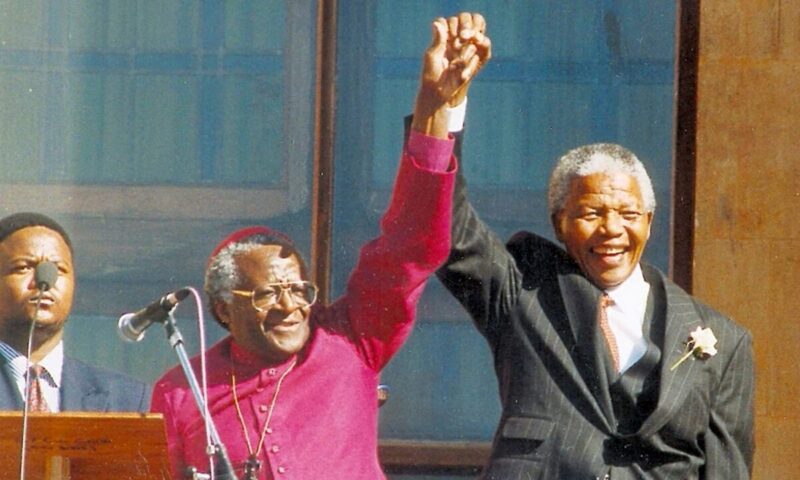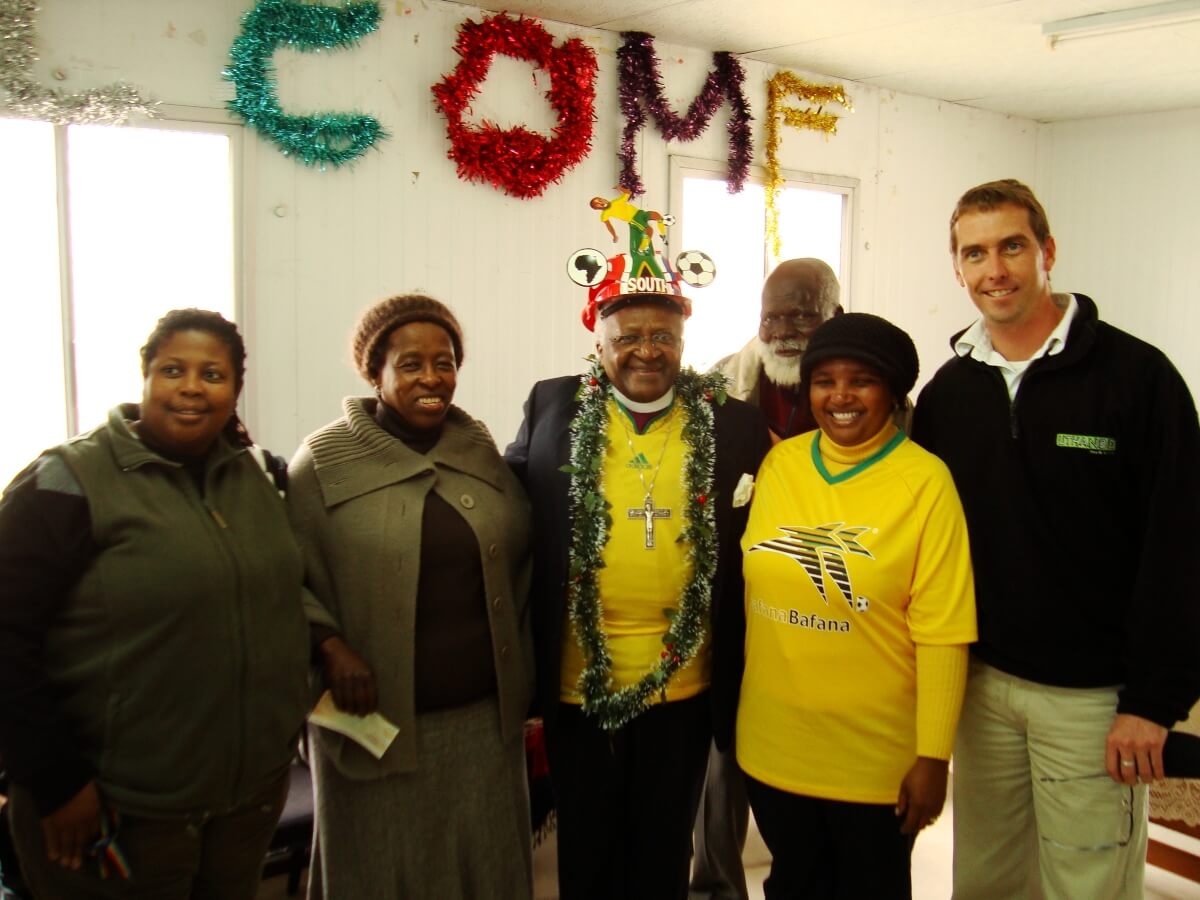
Hambe Kahle “farewell“ Archbishop Emeritus Desmond Mpilo Tutu – 1931 – 2021
“differences are not intended to separate, to alienate. We are different precisely in order to realize our need of one another”
Desmond Mpilo Tutu. A man who had the courage of his convictions. A man who fought tirelessly against injustice, inhumanity and inequality, wherever it existed. A man who spoke truth to power – whichever power he considered corrupted and immoral. Archbishop Tutu was a giant amongst men, a moral compass for the world and a champion of kindness and love for the most marginalized in society. A humble man with a huge heart, a naughtiness in his defiance, the most infectious laugh and ability to laugh, at times when tears were flowing . His voice of reason, empathy and compassion will be sorely missed, in South Africa and all around the world.
Desmond Tutu was not always loved and adored in South Africa and in various parts of the world, despite being a Nobel Prize Laureate.
For those of us old enough to remember, Desmond Tutu was one of those people in South Africa who was basically part of our daily lives growing up during apartheid, similar to Mandela. Both men were a constant; always in the news and always a topic of very heated conversation. Tutu was demonized by the apartheid government which controlled the state run media. It is fair to say that the vast majority of white people in SA disliked Tutu with varying degrees of intensity. He was the person they “loved to hate” as the saying goes. Conversely, his refusal to endorse the policy of armed struggle was not always favourably accepted by people within the black community. He was not afraid to stand alone, to take unpopular positions.
This was particularly true during the 1980’s when he travelled around the world campaigning for sanctions and disinvestment in South Africa. Tutu never agreed with or endorsed the ANC’s policy of violent armed struggle, but saw economic isolation of the apartheid state as the most effective tool to bring an end to that abhorrent system.
As a young teenage boy growing up in the 1980’s apartheid South Africa, I kept a scrap book of political events in the country. I found this article in one of my scrap books describing a protest against Tutu for his stance on sanctions and the view many took that his campaign to isolate South Africa, was negatively impacting the very same black people he was wanting to help. In hindsight, there is absolutely no doubt that by the late 1980’s, economic sanctions were having a devastating impact on the ability of the South African government to access international funding, and that it was one of the very important factors that contributed to closing the apartheid chapter in South Africa’s history book. Without doubt, Tutu was a man of vision and courage, prepared to isolate himself by espousing deeply unpopular views knowing deep in his soul that he was on the right side of history.
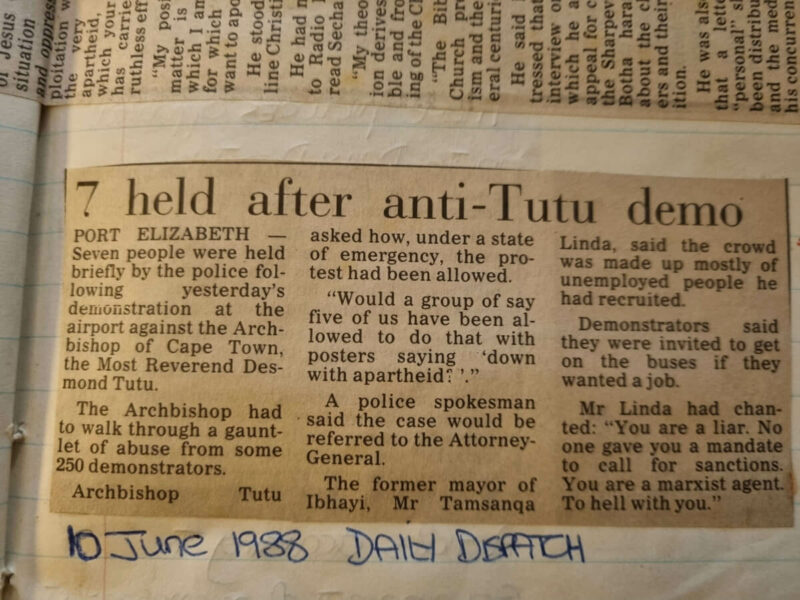
Newspaper article depicting a protest against Tutu bacause of his stance on sanctions
As head of the Anglican Church in South Africa, Tutu lived in the official residence of the church which is located in the extremely upmarket Cape Town suburb of Bishops Court. This riled white South Africans who used the opportunity to ridicule Tut for being a hypocrite, living it up in a plush neighbourhood whilst fighting for the poor. Tutu really did take more abuse, over an extended period of time, than any human should ever have to endure. He carried it on his chin because he had love in his heart and absolute dedication to his cause, a powerful combination.
There are countless stories of Desmond Tutu’s bravery, vision and tenacity, facing both the mighty apartheid government but also diffusing violence being perpetrated by angry mobs in township protests. It was really only in the later years during and after the Truth and Reconciliation Commission (TRC) that many people were able to have an insight into the true character of the man, his deep desire for fairness, justice and forgiveness, irrespective of who was the perpetrator and who was the victim. He was on the side of truth and integrity.
It was only in the later years after the collapse of apartheid and through enduring the heartbreaking catharsis of the TRC, that Tutu started to become universally admired, loved and adored. His nickname “The Arch” taking on global significance and his term for South Africa “The Rainbow Nation” finding resonance with a multi-racial and multi-cultural population deeply scared and traumatized by centuries of institutionalized racism and separation.
The first time I met Desmond Tutu was in 1991 in my capacity as a Student Representative Council (SRC) member at the Nelson Mandela Bay University (formerely known as the University of Port Elizabeth), which I attended from 1990 to 1994. My role on the SRC was to invite political leaders and change-makers to the university to address the students. Tutu and his wife, Leah, flew up to Port Elizabeth from Cape Town for the day. I collected them from the airport and spent the day with them at the university. After which, they returned to Cape Town. They were so modest, kind and thoughtful. No airs and graces, and no expectations of any lavish, red-carpet welcome.
The Arch was patron to many Non Profit Organisations in South Africa – I believe more than 200, in fact. He was completely accessible, despite being such a busy man with such a high international profile standing.
Among the many projects with which we work and support, are three seniors organisations, in Khayelitsha. We love to treat the seniors because they have had to endure so much hardship during their lives – discrimination and enforced poverty. In 2010, we contacted the office of “The Arch” to ask him to spend a morning with the Uthando and the seniors. He readily agreed.
Tutu and his wife Leah, arrived at the seniors centre in the sprawling township of Khayelitsha in their modest, unbranded vehicle, together with their driver, no bells and whistles, just simple and down to earth.
Always the patriot, and in true Tutu style, he arrived sporting fun 2010 World Cup Soccer regalia in support of the South African team “Bafana Bafana”. It was a joyous morning filled with song, stories, laughter and dance. Sadly we did not arrange a photographer for the day, so the images are very poor quality.
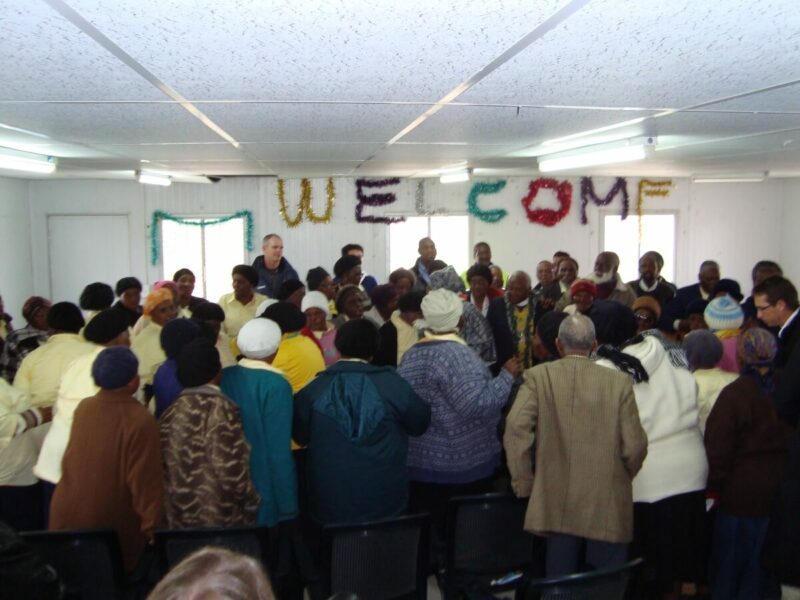
In 2015 Uthando published a book called “Abantu Abadala – Conversations with the Elders”. The book aims to reflect the kindness, love, sense of gratitude and spirit of sharing and caring that elderly black South Africans exude despite having endured a lifetime of suffering, discrimination and hatred. Archbishop Tutu very kindly agreed to write the Foreword to the book, which he did shortly before his official retirement in 2015.
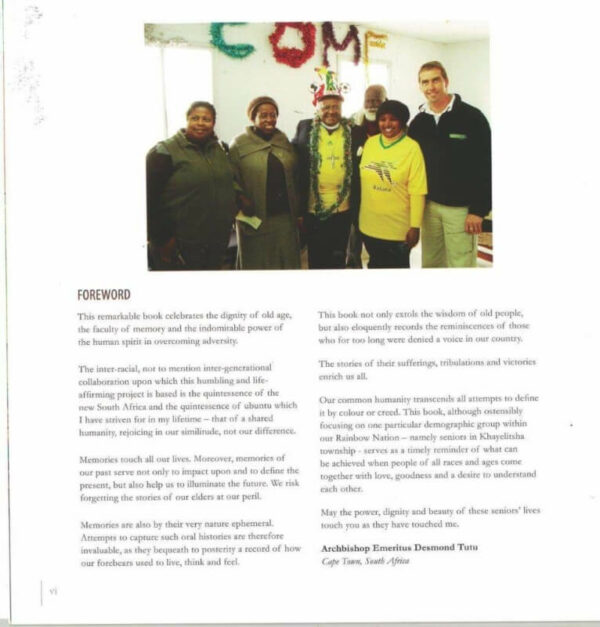
Foreword to Abantu Abadala, provided by “The Arch”
He almost did not agree to provide the Foreword because he said that the book reflected only one group within the “Rainbow Nation”. He wanted the book to reflect the stories of elderly white and coloured people as well. I argued that the stories of black South Africans were unique, they were on the receiving end of the most violent racism, exclusion and bigotry and yet they are the kindest, most loving, grateful and friendly people that I had ever met.
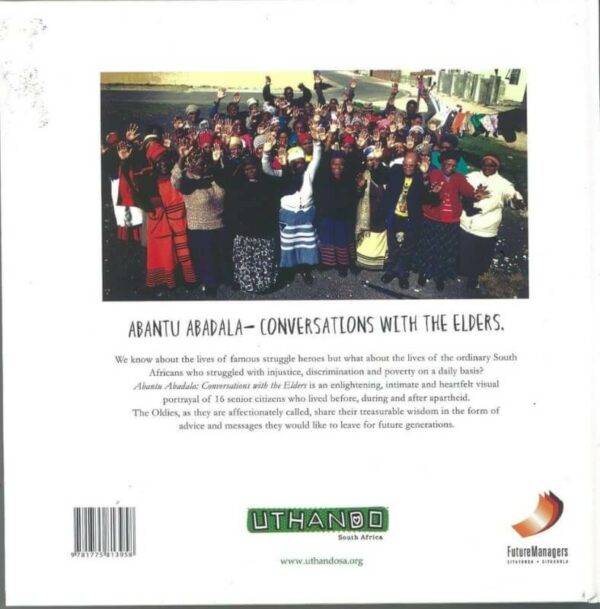
The back cover of “Abantu Abadala”
South Africa has lost two of our greatest sons, Nelson Mandela and Desmond Tutu. Their pain and their sacrifice must not be in vain. In the absence of these two men who provided a moral compass for the South African people, it is up to each and every person living in this great land, to ensure that their dream of a fair, equal and just society is realized. Time is of the essence, let’s get to work.
